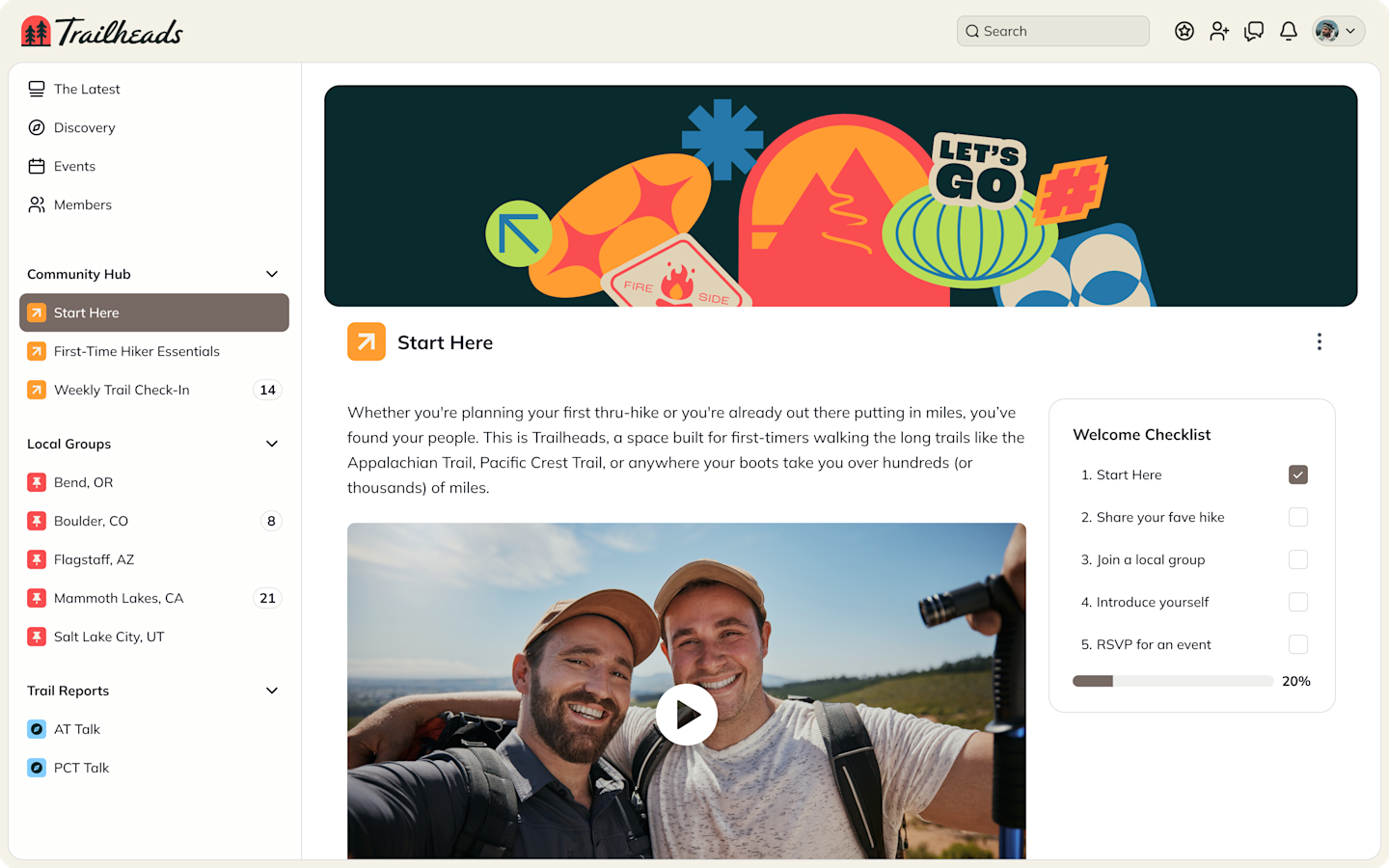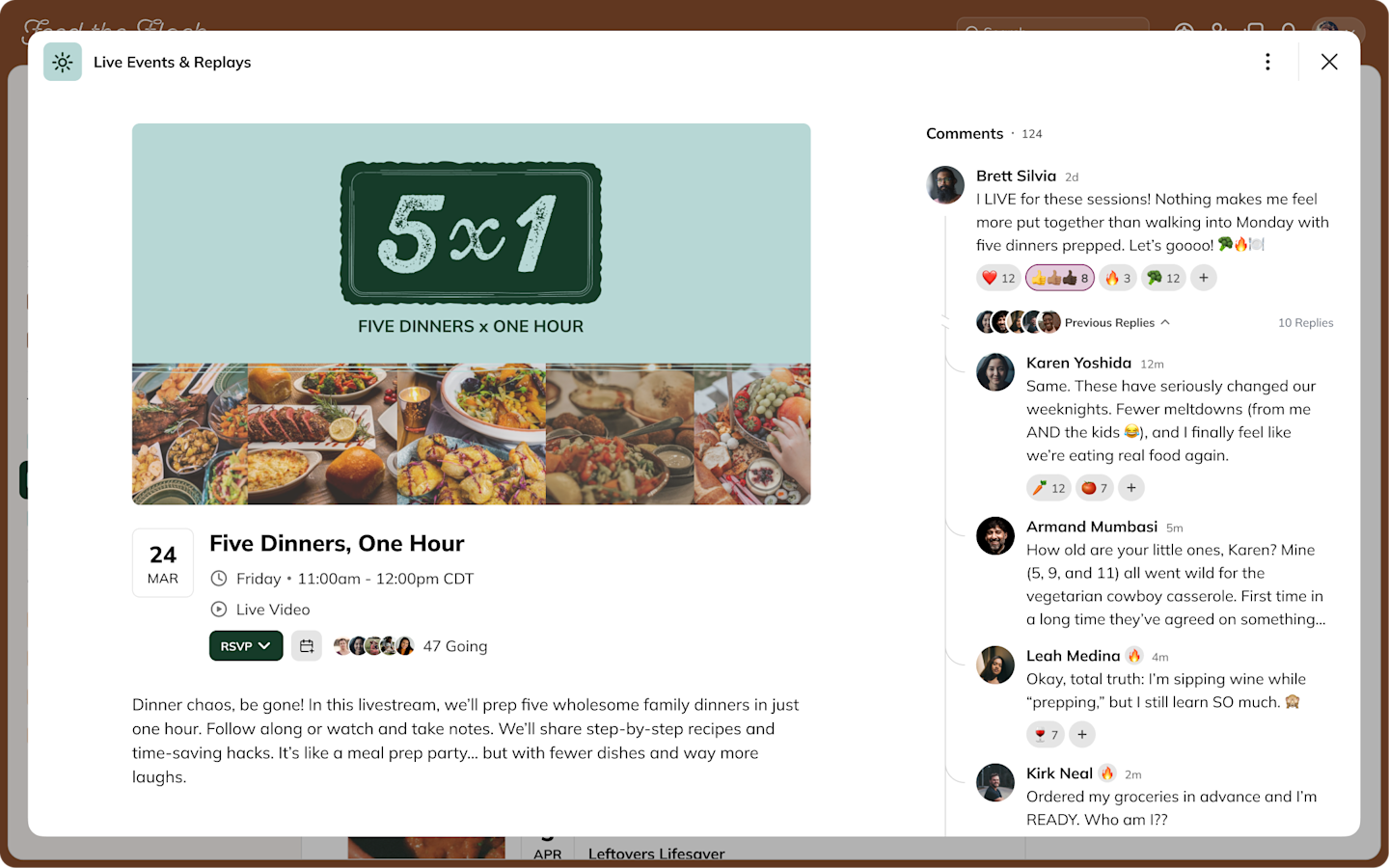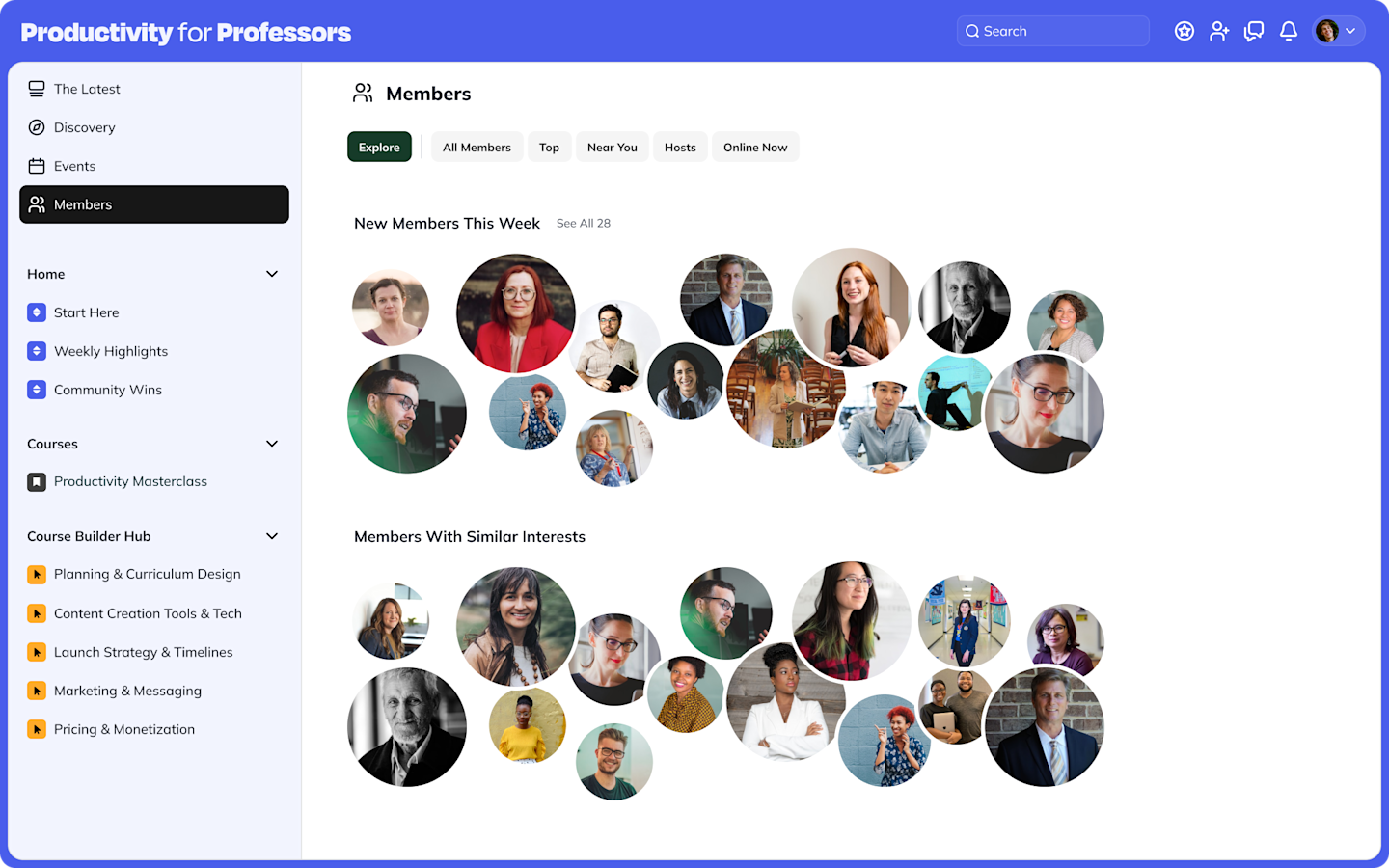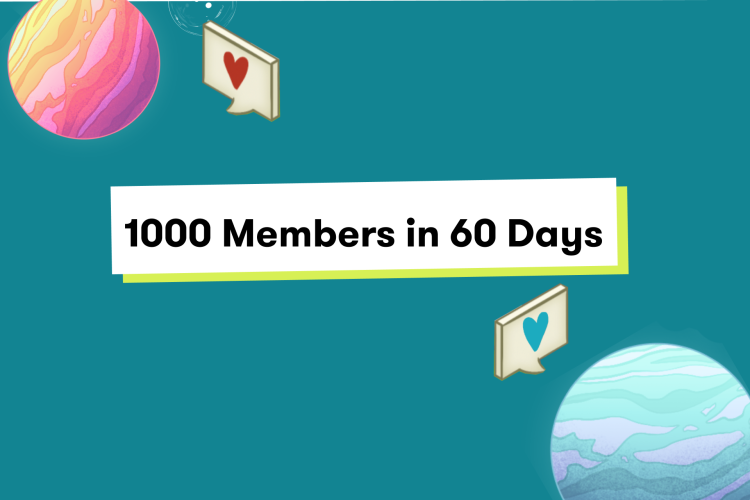Communities & Memberships
A Guide to Online Community Management
Community management is the process of shaping the interactions people have with your brand, usually online.
Author
Mighty Team
Last Updated
February 3, 2026

If you’re actively trying to improve community management online, whether on social media or in a dedicated community space, in this article we’ll share what you need to know about community management.
Try G2's top-rated community platform - free for 14 days!
What is community management?
Community management is the process of shaping the interactions people have with your brand, usually online. Many brands hire someone specifically for this purpose, known as a community manager–in fact, one of Instagram’s first hires was a community manager.
Online community management requires active listening and engagement on behalf of the brand, especially on social channels. Community managers essentially speak for the brand and can do promotions, customer support, fun engagement activities, and even public relations and damage control.
Good community management makes a brand seem less like a distant entity and more… well… human. If done right, it gives the brand a voice and personality and makes people feel something–that’s why it’s a great part of a customer engagement strategy.
Current and future customers should love interacting with your brand online. The old saying is that “people do business with those they know, like, and trust,” and good community management creates this feeling.
But community management has a bunch of other benefits for your brand too. It can help you get valuable feedback on your products and services, figure out where people are getting stuck (their user experience), or what your most attractive selling features are. For these reasons and more, if you’re a brand or business, you should consider incorporating a community management strategy into your customer service.

The power and growth of online communities
The need for community management has increased because we spend more time trying to find community online–whether on social media or dedicated communities.
Did you know?
34% of parents report turning to online communities for advice.
A 2019 study found that 76% of internet users engaged with online communities.
The biggest chunk of content creators online are small businesses (est. 168+ million).
50% of respondents to a Pew survey reported that an online community helped them meet people they wouldn’t otherwise know.
93% of consumers look to social media to get technical help with a product (Oracle).
80% of consumers have purchased something in response to social media content (Oracle).
37% of consumers trust influencers over brands (Oracle).
In 2025, creator earnings on Mighty Networks grew to $500 million.

Advantages of online community management
When you start actively managing your online community–whether you define that as social media or a dedicated community space–some amazing things start to happen.
Create conversation and buzz around your brand
Respond quickly and positively to potential PR disasters
Improved customer advocacy through conversation with real users
Get ideas for new products and services
Increase revenue or open new monetization streams
A community manager can be transformative. And since 98% of people are aggravated by customer service channels (and hate picking up the phone), having a positive interaction with a person who represents a brand (or maybe even getting help) can be a huge boost!
What is community management in an online community?
Sometimes we talk about community management in online communities. Community management in an online community means applying the principles of community management: hosting a conversation, generating community engagement, and growing brand loyalty within a focused community.
A lot of the same practices can apply, but an online community is a unique container for focused engagement that makes community management different and (we’d argue) better.
Community management in an online community means:
You’re not trying to coax people to be interested in your brand. If they join, it’s because they’re interested.
You’re not siloing content and efforts across different social media platforms–the attention is focused.
You can focus on user-generated content (more on this below), meaning you do less work than with social media.

The role of community managers
A community manager is the person who is responsible for being the face of the brand to online followers, usually becoming the voice of the brand to people in their audience and the voice of the consumer to a brand.
Remember, community managers are not simply content creators. While they may create content, a community manager is first and foremost a relationship builder and connector.
The trouble with traditional social media is that–too often–community managers do become glorified content creators.
And this is for one reason–social media companies aren’t built to create communities; they are built for broadcasting and creating followers. So often brands settle for the “community manager” to be the person answering people’s questions on social media and occasionally throwing out a witty brand post or reply.

In a dedicated community platform, the role of a community manager is different.
Instead of trying to get attention or do tech support, a community manager helps members engage with other members to find community and belonging. They host great conversations and run exciting live events.
In short, on platforms that are actually built for community, community managers can shine the most.
The role of tech
Tech has become essential for great community management. For example, on traditional social media, community managers might rely on tools for scheduling and tracking mentions (e.g. Hootsuite, Sprout Social) or perhaps a net promoter score (NPS) tracking software.
We’re also seeing brand community tech evolve in ways that change the role of community manager and make life way easier. The better community platforms get, the more they can empower community managers (and free up their admin time). The modern community platform can have tools like:
Member management and tracking
Messaging, discussions, comments, polls, etc.
Live streaming and live events
Courses and training
But at Mighty, we’re also really excited about the use of tech for building better communities. And we’ve already seen this make waves in community management.
AI for community management
Great online communities run with community management, but not simply because of good tech features.
AI is prompting a revolution in how communities are managed. We're seeing it built into community platforms more than ever. In some cases, this is just AI built into a knowledge base--sort of like AI customer service. This has a place.
But the best community platforms are using AI to boost engagement.
On Mighty, this means features like:
AI profile boosts to help members create profiles (this leads to better discovery).
AI introductions to surface interesting members to each other and introduce with one click.
Instantly generate discussion questions, schedule, and post (approved) ones.
Auto-re-engage lapsed members with 1 click; AI generates a check-in message.
These are features that help members meet each other and form friendships that last!
You can learn more about Mighty's AI features here.
How to master community management
If you’re trying to master community management, there are some principles you should know. Follow these guidelines to see real transformation in your community:
Be clear on your Big Purpose. A Big Purpose is your mission, it’s the reason people want to engage with you and/or your brand. Usually, the Big Purpose identifies the transformation you want for your members. So your community management efforts should be directed at helping them achieve transformation, whether it’s inspiring, educating, or even clearing up technical issues–it all helps your members fall in love.
Create belonging. True community management isn’t just about engagement. The magic happens when you create belonging.
Prompt user-generated content. People liking a brand post doesn’t mean much. But people posting about your brand? That’s worth its weight in gold. Sometimes this happens on social–when it’s done best, hashtags and giveaways can spur UGC. In a dedicated community, UGC happens more organically as you host a conversation around what your members care about.
Choose the right platform. Having the right platform for your community management will change everything. For example, there’s a huge difference between a community that’s an online forum on the backend of a company website and one that connects livestreaming, events, and discussions in an app.
Set clear guidelines. Psychological safety in a community is vital–that’s why having community guidelines and moderation in a dedicated community is necessary. Helping people feel safe and welcome (and protecting members from trolling and bullying) is essential for a thriving community.
Create rituals. The rhythm of a community matters, and having regular rituals and repeating actions helps people to belong. For example, creating a quarterly live event or a weekly livestream can become a meaningful ritual.
Create feedback loops. Finally, members of a community should be able to offer feedback to and through the community manager in a meaningful way. Usually, community managers seek out feedback with things like surveys.

Measuring Success
Key Performance Indicators (KPIs)
There are different ways to measure the success of your community management work on both traditional social media or in a dedicated online community:
Traditional social media
New likes, follows, and comments. It’s the most straightforward, but a growing social following can show that community management efforts are paying off.
Increased relevant organic searches. The buzz a brand generates on social is usually reflected in increasing organic searches.
Positive posts or questions about your brand that you don’t create.
Upward trends. You can use a tool like Google Trends to see growth in brand awareness.
Improved net promoter score. Measured by surveys, an NPS indicates how likely people are to tell someone about your brand.
Increased conversions. There’s not always a straight line between buzz on social and conversions, but sometimes you can see a connection–especially with huge events or viral posts.
In a community
Engagement. In any online community, active users are the first success metric–whether people are showing up and getting involved. A community platform should give you detailed community analytics to tell you how often people log on and how engaged they are.
Growth. If a community is growing and collecting new members, it’s a sign your community management is successful.
Low churn. Collecting new members won’t matter if you have high turnover. Ideally, people are sticking around too.
Increasing revenue. If your community is part of your revenue structure, good community management leads to growth in revenue thanks to a community flywheel. The average community with membership fees on Mighty charges $48/mo.
Why you need community management software?
We’ve already talked about community management on social media and community management in a dedicated community. And there is a difference. Trying to manage “community” on social media is guesswork. It almost never really works–especially at a brand level.
And that’s why moving to a dedicated online community management software can be transformative. Here are the problems with social media that a dedicated community management software solves:
Silos: Community management on social media is challenging because of content silos. Even if you get a bit of engagement, it’s happening on multiple platforms. Bringing members into one place helps you focus and see results.
Content treadmills: Social media can be exhausting for brands–wondering what to create and–let’s be honest–seeing most of your efforts fall flat. A dedicated community platform can actually take you from a content treadmill to a proper community–where the community manager’s job isn’t creating, it’s convening.
Lack of control: Social media lets you control nothing. You fight the algorithm and–no matter what platform you’re on–most of your followers never see it. A dedicated platform doesn’t keep you fighting to be seen.
When brands move to dedicated communities, community management becomes totally different. Instead of trying to get attention and reactions, you can focus on nurturing relationships with members who want to be there.
So what happens when you build your brand community on dedicated software?
More value per member. As you can focus on helping members belong instead of chasing likes and follows.
Brands that build themselves. The promise of community management software is nothing to take lightly–a brand that builds itself. It’s a big deal. Because when you bring people together in an intentional and dedicated space, that’s what happens. The energy flows and your brand grows.
You unlock REAL UGC. On social, the best you can hope for from user-generated content is an occasional post about your brand. But on a community platform, you’re hosting the conversation.
For example, Lego. Lego has mastered online community building with a space that lets builders submit designs--the best ones can become kits!
Conclusion
Online community management is important, and will probably only increase in importance. At a minimum, it can create conversation about a brand. But having focused community spaces can open up ways for members to belong, that’s truly transformative.
Ready to start building your community?
Start a free 14-day trial to explore Mighty—no credit card required.
More like this
Join Mighty Community
Learn the principles of Community Design™ (and see them in action) alongside thousands of creators and entrepreneurs. It's free to join!

Online Courses
Creating a Course
Teaching a Course
Course Platforms
Selling a Course
Communities & Memberships
Community Platforms
Managing a Community
Building a Community
Growing a Community
Monetizing a Community
Content Creation
Creators & Entrepreneurs
Monetization
Content Creation
Starting a Business
Website Builders
Creating & Managing a Website
Events
Event Platforms
Hosting & Marketing Events
Branded Apps
Creating a Mobile App
Coaching Apps
Community Apps
Coaching
Mastermind Groups
Starting a Coaching Business
Coaching Platforms
Filter by Category
Online Courses
Communities & Memberships
Creators & Entrepreneurs
Events
Branded Apps
Coaching
Start your free trial
14 Days. No Credit Card Required.





















